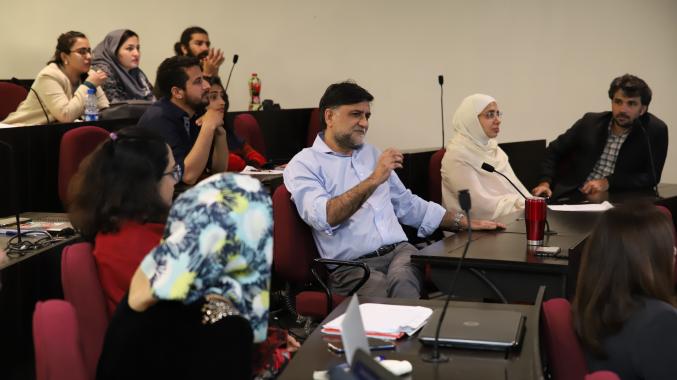
Syed Ahsan Ali and Syed Maratib Ali School of Education (SOE) has launched a new presentation series ‘SOE Models of Educational Innovation’. The presentation series has been initiated to present innovative solutions to problems of access and quality in education. The series will explore innovative models of education, discuss challenges of design, implementation and evaluation for educational interventions, and identify possible areas of research and the effective use of evidence-based learning. This interactive forum will also give students a chance to critically reflect on the organisation’s theory of action/change, the scale and sustainability of the model as well as its larger policy implications.
On February 27, 2019, LUMS SOE conducted the first of its presentation series which hosted the project team from Advancing Quality Alternative Learning (AQAL), a programme managed by the Japan International Cooperation Agency (JICA). Ms Chiho Ohasi, Chief Advisor JICA, AQAL, and Mr. Sajjad Haider, Programme Specialist – Policy and Research presented on the AQAL programme. The session was attended by Dr. Tahir Andrabi, Dean SOE, SOE faculty and students.
Ms. Chiho Ohasi presented on the current scenario of the Education in Pakistan. She provided an overview of statistics to show the grave situation in the current Pakistani education system in terms of access, literacy, learning crisis and out of school children. Discussing the learning crisis, she mentioned that on average only about half number of grade 5 students currently in schools can solve division questions, read sentences in English, and read full stories in Urdu/Sindhi/Pashto. She discussed how children in middle school and higher secondary schools have the most number of out of school children due to which an accelerated learning programme is the need of the hour.
She then proceeded to give a brief overview of their AQAL Project, which is a non-formal learning programme that aims to provide alternative education opportunities for socially vulnerable and disadvantaged people in Pakistan, especially women. It does so by promoting and utilising the connections between literacy, life skills and vocational education, and by linking together JICA’s broader developmental projects in Pakistan to promote cooperation between them. The AQAL Project offers children, young people and adults an opportunity to acquire basic reading and writing skills as well as life skills by participating in non-formal basic education and literacy classes.
Mr. Sajjad Haider took over from there and briefed the audience on how a large number of out of school children cannot be accommodated in the formal education schools due to which non-formal schools were necessary. He then explained the difference between both, and how non-formal education tied to their accelerated learning project which is a 30-32 months programme compared to a traditional education of 60-72 months, and explained the curriculum strategies and features of their accelerated learning programme features.
He then elaborated on how they integrate skill-based learning with literacy by merging different learning objectives with similar outcomes and erasing any repetition. He then gave an example of a social studies chapter about tree plantation in Urdu language, where the learning outcomes was for students to differentiate within trees and plants around them and know their importance, while also being able to grasp the Urdu grammar used in the topic.
The session was interactive as there was an exchange between the audience and the speakers from the beginning. On asking what issues the Pakistani education system faces, Sumbal Buksh, a student of SOE mentioned that rote learning was a big issue while Sumaiya Zafar Faridi mentioned lack of teacher capacity building as a challenge. There was a lengthy discussion on whether the model could also be incorporated in mainstream education leading to a cost cut, which leads to many viewpoints with some people advocating for the cost cut it would bring, while some supporting the traditional 60 – 72 months system because of its depth and breadth. There were also discussions on teacher training for the programme, on which Mr. Sajjad Haider explained that teachers are given an induction training, equipped with pedagogical skills and briefed on child psychology. The event was well received and went above the allotted time limit due to an extended Question and Answer session.








